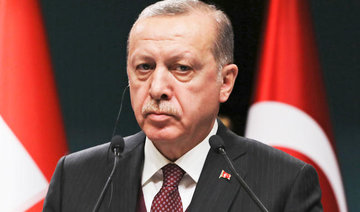ANKARA: Turkey will not waste time on the northern Syrian city of Manbij, but will focus on the region to the east of the Euphrates River in Syria, Turkish President Recep Tayyip Erdogan announced on Friday.
Addressing a meeting of his ruling Justice and Development Party in Ankara, Erdogan underlined that the priority for Turkey was to clear the region of terrorists and return it to Syrian people.
He reiterated that new terror formations along Turkish borders were unacceptable and were a “red line” for domestic security.
Erdogan criticized the US for providing the Syrian Kurdish YPG militia with weapons and supplies. Ankara considers this group to be the Syrian offshoot of the PKK, which is listed as a terror group by NATO, the US and the EU.
YPG, the lead group in the US-backed Syrian Democratic Forces (SDF) alliance, controls almost all the region to the east of the Euphrates River, as well as Manbij district to the west, which was once in the hands of Daesh.
Stressing that Turkey would prefer not to enter into conflict with anyone, Erdogan warned that it was irrational for the US to choose a shady organization over Turkey.
“This is our last warning,” Erdogan also said.
Manbij has always been a key district in the strained relations between the two countries. A roadmap agreed between Turkey and the US in June requires the withdrawal of the YPG from Manbij, while the two countries committed to conduct joint patrols to monitor stability in the region.
Troops from the two NATO allies have recently begun training together before the start of joint patrols. The troops have been instructed on how to communicate, work and operate with each other by using the same military tactics.
According to Dr. Magdalena Kirchner, a senior analyst at Conias Risk Intelligence in Mannheim, Germany, Erdogan is using the current momentum to further reduce the influence of the Syrian Kurdish Democratic Union Party (PYD) in the local administration and security forces.
“Given the heavy involvement of Turkey in other areas of northern Syria, another ground operation might be costly and politically risky — especially as it will increase concerns in Europe, where the question of hundreds of Western foreign fighters held in PYD prisons remains unsolved,” she told Arab News.
However, Kirchner, believes the upcoming elections in Turkey might change the country’s approach in Syria.
“It is not impossible that Turkey will escalate militarily in the border region if the increasing tensions between AKP and its nationalist ally the Nationalist Movement Party (MHP) induce the government to enhance its nationalist profile ahead of the important local elections in March 2019,” she said.
MHP leader Devlet Bahceli, who previously formed an alliance with Erdogan ahead of the June presidential and parliamentary elections, announced on Tuesday that his party will not seek an alliance with AKP in the elections.
Oytun Orhan, a Syria analyst at the Ankara think-tank ORSAM, said that Erdogan’s statement was a sign that Turkey is losing faith in the implementation of the Manbij roadmap and does not have any expectations from the agreement with the US.
“Erdogan therefore implies that the US is wasting Turkey’s time with this deal. So it is time for Ankara to focus on other parts of Syria where terror groups are consolidating their power east of Euphrates river,” he said.
Experts also noted that Turkey has taken advantage of the current status quo following the Turkish-Russian deal for a demilitarized zone in Idlib, where threats from rebel groups have been reduced for the present.
According to Orhan, Turkey would most likely concentrate on an offensive against Tal Abyad, an Arab-majority town located to the north of Raqqa, near the Turkish border, which is currently under the control of the YPG militia.
As it is strategically located between the major cantons of Kobani and Qamishli, any operation against Tal Abyad would also gain the support of many Arab tribes who took refugee in Turkey during the civil war in Syria.
“The US has no military base in Tal Abyad, so there would be no risk of a direct clash with the American troops. If YPG withdraws from this town following a Turkish offensive, the geographical integrity of Kurdish regions in the north would be seriously disrupted,” Orhan noted.
“Such an operation against terror groups will also bear a psychological meaning, showing that the impunity of the eastern part of Euphrates will end for the regional actors.”


Turkey to focus on eastern bank of Euphrates in Syria
Turkey to focus on eastern bank of Euphrates in Syria

- Erdogan states his priority is to end Kurdish dominance across his southern border
UAE, US discuss regional developments in Yemen and Gaza, WAM news agency reports

- This month, drones hit a kindergarten and a hospital in Kalogi in South Kordofan, killing 114 people, including 63 children, according to the World Health Organization
ABU DHABI: The United Arab Emirates’ Foreign Minister Sheikh Abdullah bin Zayed received a phone call from US Secretary of State Marco Rubio, where they discussed regional developments, topped by situations in Yemen and Gaza, state news agency WAM reported on Tuesday.
The call came after the latest developments in Yemen as Saudi-led coalition forces attacked the southern Yemeni port of Mukalla.
© 2025 SAUDI RESEARCH & PUBLISHING COMPANY, All Rights Reserved And subject to Terms of Use Agreement.













